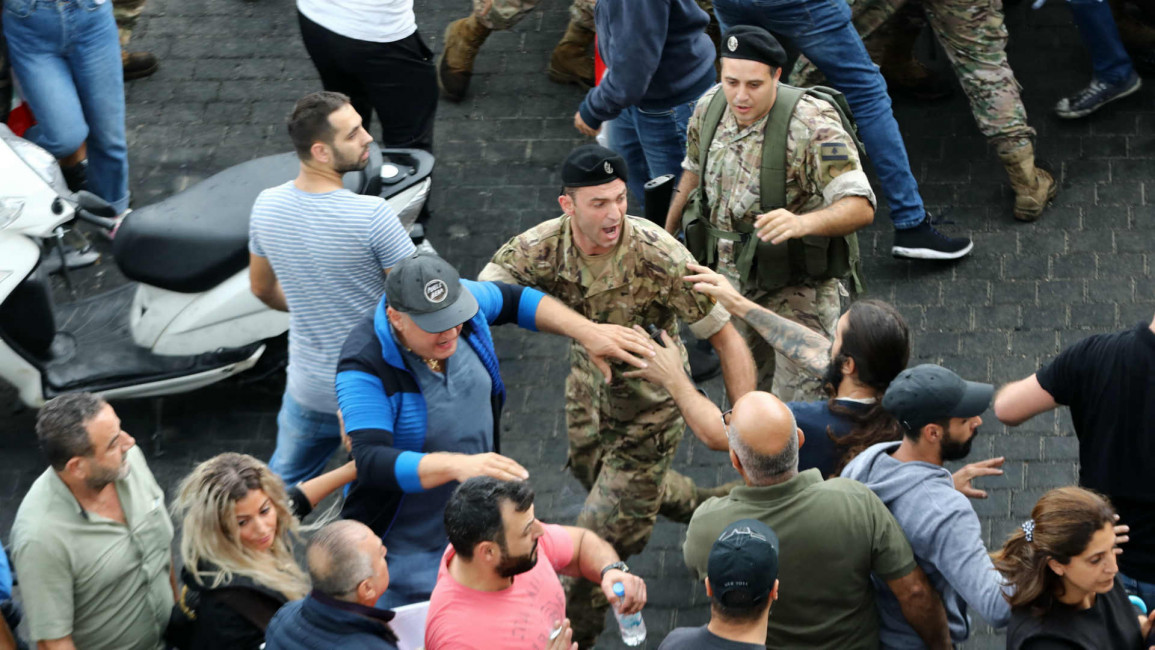Lebanon protests turn violent as army removes road-blocking demonstrators
A video published on social media showed soldiers forcefully removing protesters from the Nahr al-Kalb highway, which links Beirut and the north of the country, with "many people" arrested, according to Lebanon’s Daily Star newspaper.
Protesters captured in the video shout "peaceful, peaceful" as they are grabbed by soldiers and pushed off the road.
Comment: Lebanon's historic rebellion faces its moment of reckoning
One protester fainted at the sit-in on the motorway, according to Lebanon's Al-Jadeed news.
Footage also emerged of the army assaulting protests in Saida, downtown Beirut, Jal al-Dib, Zouk Mosbeh, Ghazieh and Batroun.
A video clip from Ghazieh in southern Lebanon showed dozens of soldiers, some in riot gear, advancing on protesters, threatening them with batons raised.
Twitter Post
|
The number of protesters on Thursday was estimated to be in the thousands, with MPs including Sami Gemayel and Elias Hankash of the Christian Maronite Kataeb party, and businessman and MP for Kesrouan, Neemat Frem, also present.
Twitter Post
|
In spite of the clips evidencing the army's use of force against protesters, the official army Twitter account tweeted on Wednesday: "Our soldiers are deployed around the clock to escort your peaceful movement and protect you at this delicate stage".
Twitter Post
|
The incidents of violence contrast with viral clips of crying soldiers standing guard by Wednesday's demonstrations, in a seeming gesture of solidarity with the protesters' aims.
A proposed tax on mobile messaging applications last week sparked a spontaneous, cross-sectarian mobilisation that has brought Lebanon to a standstill and united the people against its hereditary, ruling elite.
The protests, which call for the resignation of the government, show no sign of abating despite the government's adoption of an emergency economic rescue plan which includes a programme of privatisations, a decision to scrap new tax hikes and halving the generous salaries of ministers and lawmakers.
Lebanon's Christian leaders also gathered on Wednesday to discuss the political turmoil, after which Maronite Patriarch Bechara Boutros al-Rahi told Lebanese television the government reform package was a good first step, however he reiterated the need for a new government.
Comment: Lebanon burns with hope and fury
Prime Minister Saad Hariri met with the Chairman of Association of Banks in Lebanon Salim Sfeir and the Central Bank Governor Riad Salameh on Wednesday to discuss further financial reforms.
Lebanon's banks remained closed for the fifth working day in a row on Wednesday, amid uncertainty over how Hariri planned to shore up the billions of dollars needed to implement the financial reforms.
Both banks and the political class have been objects of protesters' anger, with dozens of demonstrators on Monday night having gathered in front of the central bank in Beirut, accusing Riad Salameh of worsening the country's debt through faulty monetary policies.
Follow us on Twitter: @The_NewArab

![Hundreds demonstrate against the White House Correspondents' Dinner in support of Gazan journalists. [Brooke Anderson/TNA]](/sites/default/files/styles/image_330x185/public/2024-04/5cde0bce-4652-4e28-a001-f06b9b8f8e28.jpg?h=ddb1ad0c&itok=R_uaRAn7)

